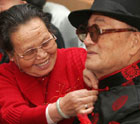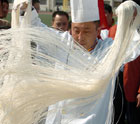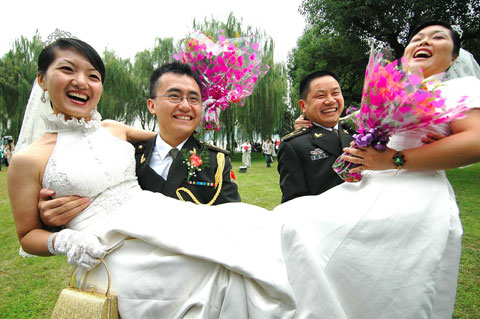BEIJING - The world should not fear China's military rise, premier Wen Jiabao said Friday, as he vowed to improve relations with Japan.
In a two-hour news conference at the end of China's two-week legislative session, Wen said the nation is opposed to the militarization of outer space despite a recent test of an anti-satellite weapon.
Wen said the January test that destroyed a defunct Chinese weather satellite was not targeted at any other nation and did not violate any international treaties.
"China always advocates for the peaceful utilization of outer space and we are always opposed to an arms race in outer space," Wen said, adding Beijing was repeating its calls for an international convention banning weapons in outer space.
"China's position on the peaceful utilization of outer space remains unchanged," he said.
Wen also said China's military budget, which was boosted by 17.8 percent this year, was smaller than other developed countries on both an aggregate and per capita basis.
He said a planned trip to Japan next month will be an "ice-thawing" journey furthering improving relations between the neighbors and sometimes adversaries.
It will follow Japanese Prime Minister Shinzo Abe's "ice-breaking trip" to China last October, he said.
On the Taiwan question, Wen said "We are strongly opposed to any secessionist activities aimed at achieving Taiwan independence."
"We will never allow anyone to change the history, the reality and the universally recognized legal status of Taiwan -- that is Taiwan has been an inalienable part of Chinese territory since ancient times," he said.
When asked to comment on the Dalai Lama, Wen said Beijing is willing to have dialogue with him as long as he gives up efforts for Tibetan independence.
"As long as the Dalai Lama recognizes that Tibet is an inalienable part of Chinese territory ... and as long as the Dalai Lama gives up his efforts to split the county, we will be in a position and we are willing to have consultations and dialogue," Wen said.
He added: "The door is always open."
After three decades of reform, China now has the world's fourth biggest economy, and Wen said Beijing would continue to push its reform policies, but that they had to focus on improving living standards for the vast majority of China's 1.3 billion people who have been left behind in the economic boom.
"The well-being of the whole society cannot be improved unless the lives of the most vulnerable groups are improved," he said.
"At this stage what I think is most important is to ensure that people have equal opportunities in education. We need to continue to pursue a pro-active employment policy," Wen said.
"We need to gradually reduce the gap in terms of income distribution and we need to put in place an urban-rural social security system which covers all people," he said.
Wen said the government was working to ensure that all children in China would receive nine years of free education, and that reforms were planned for health care systems in both urban and rural areas.
On its last day, the legislature passed a milestone property law strengthening protection for private businesses and property and also revised a tax law to cut out preferential rates for foreign companies.











